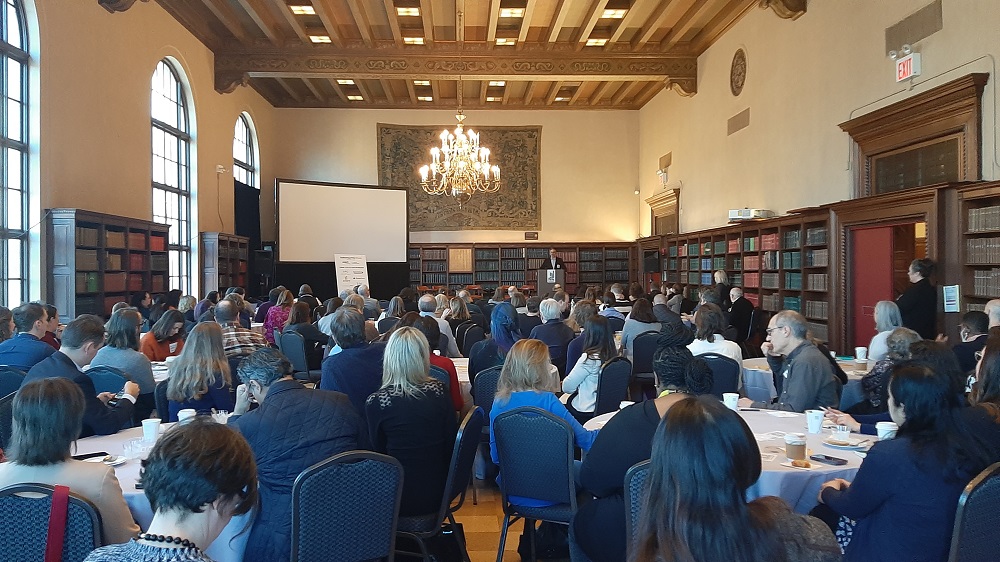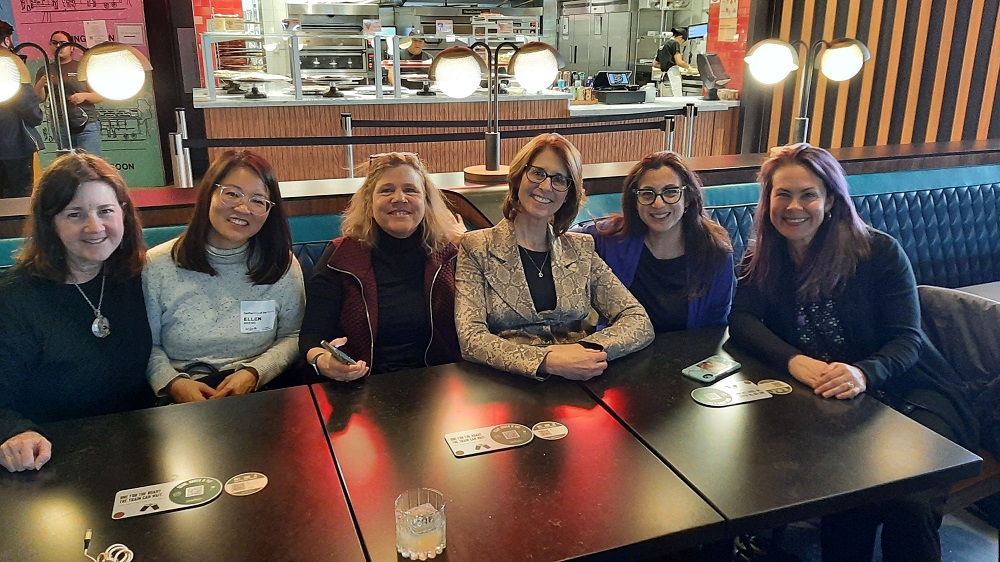How many ghostwriters does it take to screw in a lightbulb? We’ll never know because they all signed an NDA. Soliciting some laughs and groans, Gotham Ghostwriters’ CEO Dan Gerstein kicked off the inaugural Gathering of the Ghosts in New York City. About 170 people attended the sold-out one-day event. In his introduction, Gerstein noted that there is a sea change in authors publicly recognizing their writers, making this a good time to bring ghosting into the light.
Emily Paulsen, president of ASJA, a cosponsor, also welcomed the attendees, who included seasoned book collaborators, short-form journalists and content marketing writers, and newer writers. Paulsen noted, “We are your people.” The ghostwriters came from as far as the U.K. and Los Angeles to the event at the New York Academy of Medicine library in Manhattan, a venue with gravitas and a sense of history.
Embrace the collaboration role
The keynote fireside chat included several established ghostwriters sharing how they find and collaborate with authors. Moderator Daniel Paisner shared that trust goes both ways: “[They] trust us to deliver their story or their truths. We are trusting them to be honest.”
The panelists agreed that you have to draw your own line in the sand about choosing who to work with. Paisner said he helped Ivanka Trump write her first book. “She was delightful and lovely to me. But I feel complicit in helping build that Trump brand. I’ve sort of scrubbed that from my CV,” he said.

When asked to share advice about the profession, Holly Gleason recalled what a professor said: “Always remember your job is to be the mouthpiece for the person reading. Make sure to have the conversation with the subject that the reader would want to have.”
Sportswriter Seth Davis’s line got one of the biggest laughs of the day when asked how best to nag the author when they need to respond to something. “You can be a writer or you can be not annoying. Choose your lane.”
Help clients pick the best publishing path
The next panel discussed the pros and cons of traditional, hybrid, and self-publishing and how to walk clients through these options. The panelists agreed that ghostwriters play a vital role in setting author expectations and understanding how each publishing type will affect the process, their goals, and their wallet. It’s best to have the conversation early. “You know a lot more about the publishing industry than your author does. The knowledge is what gets you in the door,” said ghostwriter Josh Bernoff.
Traditional publishers can have a big impact on authors (and credibility for writers), but it’s hard to get agents’ and publishers’ attention, and there’s no guarantee of success. Bernoff tells authors that “if we start now, we won’t see a book for 18 months,” and about 20% of the work involved is writing the proposal.
A hybrid publisher provides many of the same opportunities but can cost $20,000 to $50,000 upfront, not including the writing. With hybrid publishing, the writer and author retain creative control and intellectual property rights, decrease the time to market to six to nine months, and balance upfront costs with higher royalties on sales, panelists said. Self-publishing can be faster and cheaper but must be done carefully. Look for a guide to publishing models coming out soon from the Independent Book Publishers Association (IBPA).
Authors and writers both need to know what they want out of the book. For authors that might be getting keynote addresses and other speaking opportunities, or the ability to say they are a best-selling author (which no ghostwriter can promise). Ghostwriters should also know what they want out of a project, including if they’re trying to establish a name/expertise as a traditionally published writer.
Panelists agreed that writing book proposals is a specialty and a proposal can be great but still not salable. That can be because comps were bad, too many similar proposals are circulating, or a similar project already sold. Regina Brooks, president and CEO of Serendipity Literary Agency said she needs three things to take on a nonfiction book: platform, incredible writing, and a hook. Agents often pair ghostwriters with authors, and she invites writers to contact her, sharing what they write, what they want to write, and their portfolio. As a matchmaker, Brooks considers the writer’s availability, author chemistry, and understanding who you work for (sometimes it’s the agent or editor, not the author).
The money dance
“Most ghosts horrendously undercharge,” said writer Michael Levin to resounding applause. Writing in someone else’s voice is hard and conceiving of a successful book is hard. “If you’re undercharging, and you probably are, you’re impoverishing yourself and your loved ones for no reason.” He recommends that when quoting your next project, double the price and add 20%. “If you’re not having a panic attack or trouble breathing when charging your rate, your rate is too low,” Levin said. Even if you get half the projects as a result, you’ll earn the same and do half the work.
Panelist Marcia Layton Turner, ASJA member and founder and executive director of the Association of Ghostwriters agreed about pricing. When Layton Turner interviewed 20 authors for her PhD thesis, 40% of them said that ghostwriters undercharged.
The discussion turned to how to be credible as a potential ghostwriter, which can be less of a burden than many think. Layton Turner gets most of her work through referrals. When connected to the right people, potential authors come knocking, pre-sold. Her website confirms her credibility, listing what she’s written (if allowed), honors, awards, and degrees. “Generally, it takes one phone call before getting the deal. The website is just backup,” she said.

Levin said we shouldn’t overestimate the number of choices authors think they have. Many people don’t know two writers—they just know you. If an agent or other referral gives them your name and vouches for you, you have a great advantage.
Listing books on your website was a big discussion point, with Kevin Anderson of ghostwriting firm Kevin Anderson & Associates arguing that writers need to build clarity in the relationship early, to at least get your name in the acknowledgments and credits. One way to make it a win for clients is to show that you can help them get more book publicity by sharing that relationship.
The panelists all agreed to get the money upfront, not through royalties. Most books don’t earn out their advances, so royalties “are the hardest money I never earn,” said Levin.
Be the visible ghost
It’s not easy to talk about money, but ghostwriters are interested, one reason the topic spilled over into the next panel. A new writer pointedly asked the panelists what they received for their last book. The answers were: $65,000 for a business thought leadership book, $95,000 for thought leadership by a medical school dean, $125,000 for a business leadership memoir, and $225,000 for a business book.
This panel focused on how getting your name into the world can bring work. Panelists showed multiple ways to do that. Bryna Haynes, founder and CEO of WorldChangers Media adds value to a ghostwriting relationship by focusing her social media efforts on clients, which in turn shines a light on her. She highlights her clients during the writing process, the launch, and six months later. She also checks in with clients after publication, learning about awards and sales, which can help with her social media promotions.
Pauleanna Reid, founder of the WritersBlok agency shares her passions and struggles on several social media channels. Building a community brings referrals, but also potential clients can see how she treats serious subjects. She said that getting featured in media helps too, including podcasts. “Once you’re discoverable, people can contact you.”
Carol Tice, founder of the Freelance Writers Den uses LinkedIn as her only social media channel and said she gets many referrals there. Writing an e-book on how to hire a ghostwriter shows potential clients that her writing is simple and clear and she can make complicated subjects understandable.
Wrapping up
The last two panels were about artificial intelligence (AI) and writing, and a town hall. The AI panelists shared that the technology is not yet in a position to take our work away. “We’re expecting too much from AI way too soon,” one said. The low-hanging fruit, formulaic work, will be the first for AI to take over, but AI does not have the skill to “pull the story out…it can’t create feelings and emotions,” said one panelist. “As long as you can make a reader care, you’ll have a job.”
The closing event, the town hall, split time between talking about how to make the ghostwriting world more inclusive and soliciting feedback on the day and for future events. Reid, who spoke on a previous panel, stated the obvious: “This room should reflect the world we live in, which this room does not.”
The panelists spoke of the difficulties, both personally and from their communities, in gaining access to traditionally white, heterosexual spaces in publishing. Michael Franklin was shocked to not see any Black people at the Professional Speechwriters Association meeting he attended during college. Someone from the association told him there were only a few Black speechwriters, prompting Franklin to contact them and do his own research. He found hundreds online and on LinkedIn and is now cofounder and executive director of Speechwriters of Color.
How to make ghostwriting more inclusive? Panelists recommended that publishing teams, including agents, need to take accountability to bring more people of color into the fold. Mentoring members of marginalized communities can help too.
The response to the Gathering of the Ghosts was overwhelmingly positive, but easily a dozen people shared ideas for what to add in the future. Attendees expressed interest in a more extensive gathering as well as a desire for more networking and greater price sharing.
Debbie Abrams Kaplan covers supply chain, health/medicine, and business (and often the combination) for journalism and content marketing clients. She also ghostwrites thought leadership articles. Debbie is a long-time ASJA member and the current ASJA advocacy chair, focused on fighting state and federal freelance-busting legislation.

